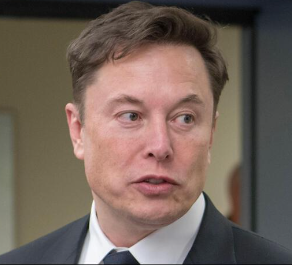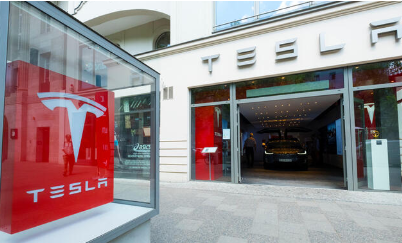Tesla’s Crisis Deepens: Stock Crashes, Global Sales Decline, and Political Turmoil
Input
Modified
Wall Street’s Wake-Up Call: Tesla’s Stock Plunge and Market Uncertainty Elon Musk’s Struggles: Leading Tesla Through Unprecedented Challenges A Global Sales Slump: How Tesla’s Decline Reflects a Broader Economic Crisis

Wall Street’s Wake-Up Call: Tesla’s Stock Plunge and Market Uncertainty
Elon Musk’s name has been synonymous with innovation and disruption, but lately, his company Tesla has found itself facing some of the harshest financial realities in its history. Tesla’s stock has cratered, and the news of its dramatic decline is sending shockwaves across Wall Street. While the electric vehicle giant’s troubles are numerous, one thing is clear: the company’s current struggles are about more than just bad sales figures. They are entwined with political forces and market instability, particularly the ongoing trade tensions between the U.S. and China, which threaten to destabilize not only the electric vehicle market but the broader financial landscape.
It’s not just Tesla’s faltering performance that’s raising alarm bells. Many financial analysts believe the situation is reflective of a larger economic issue at play, driven by uncertainties related to U.S. trade policies and global market concerns. Specifically, President Trump’s tariff policies are beginning to have serious consequences on global markets. The volatility generated by these policies is destabilizing price indices, which in turn is putting pressure on economic growth projections for the coming year. Tesla, as one of the most visible companies in the electric vehicle sector, is taking a hit that many believe may be a harbinger of greater economic challenges ahead.
Tesla’s stock has taken a nosedive in recent weeks, and the financial community is scrambling to re-evaluate its outlook for the company. What was once seen as an unstoppable force in the electric vehicle market is now grappling with the reality of slowing growth and increasing market competition. According to financial analysts, Tesla’s plummeting stock is not just a result of poor performance in its core markets, but rather a larger, more complicated set of factors, including broader economic concerns, shifting market dynamics, and a decline in consumer confidence.
In recent days, Tesla’s stock has dropped significantly, with Wall Street rethinking its sales projections for the company in light of disappointing global performance. Analysts have been forced to reassess the company’s ability to meet its sales targets, especially as demand for electric vehicles in some key markets has stagnated. Tesla’s dominance in the electric vehicle space is being challenged not just by other automakers, but by changing consumer preferences and an increasingly complex global market.
The financial community’s skepticism toward Tesla is compounded by a broader sense of unease in the markets. As President Trump’s tariffs continue to disrupt global trade and economic activity, the likelihood of a market slowdown is increasing. Tesla, being a global player, is acutely vulnerable to these market shifts, especially in regions like China, where tariffs have placed a significant strain on the company’s ability to expand its market share.

Elon Musk’s Struggles: Leading Tesla Through Unprecedented Challenges
The financial pressure on Tesla is not lost on Elon Musk himself. In a rare moment of vulnerability, Musk admitted that he is running Tesla and his other ventures with “great difficulty.” This admission has resonated deeply with investors and industry watchers, as it reveals the weight of the challenges Musk is facing in the current economic climate. Musk, known for his boundless confidence and ambitious goals, is now confronted with the harsh reality of running a company that is struggling to stay afloat in an increasingly unstable financial environment.
Musk’s statement is especially significant considering his history of optimism and bold predictions for Tesla’s future. In the past, he has repeatedly projected ambitious growth targets, even as the company faced operational and financial challenges. Now, as Tesla’s stock continues to falter, Musk’s admission of difficulty raises questions about his ability to steer the company through its current crisis.
For Musk, this is more than just a financial setback—it is a personal and professional challenge. He has built his reputation on the back of Tesla’s success and has promised investors that the company would revolutionize the automotive industry. But with the company’s global sales plummeting and the broader economic climate becoming more uncertain, the road ahead looks much more treacherous than it did even a few months ago.
While the broader economic climate and political factors certainly play a role in Tesla’s decline, the company’s global sales performance is the central driver of its financial troubles. Tesla’s sales have significantly underperformed in several major markets, including the U.S., Europe, and China, which are key regions for its electric vehicle sales.
In the United States, Tesla has faced stiff competition from traditional automakers and other electric vehicle manufacturers. While Tesla remains a dominant player in the electric vehicle space, it is no longer the only game in town. Established automakers like General Motors and Ford are ramping up their electric vehicle offerings, while new entrants like Rivian and Lucid Motors are also making a push for a slice of the market. As these competitors flood the market with their own electric vehicles, Tesla’s share of the U.S. market is starting to shrink.
The situation in Europe is even more concerning. Tesla’s sales have fallen sharply in key European markets like Germany and France, where the company once enjoyed strong demand. However, Tesla is now facing increasing regulatory pressure and competition from European automakers, many of which are now focusing their efforts on the electric vehicle market. As European governments impose stricter emissions regulations, traditional automakers are rapidly adapting to the new environment, making it harder for Tesla to maintain its dominant position.
Perhaps the most significant blow to Tesla’s global sales, however, is the company’s performance in China. Once seen as Tesla’s biggest growth market, China has become a major headache for the company. The trade war between the U.S. and China has created a volatile environment for Tesla, with tariffs and regulatory barriers making it difficult for the company to expand its footprint in the country. Despite the opening of a Gigafactory in Shanghai, Tesla has faced stiff competition from local electric vehicle manufacturers, who have captured a significant portion of the Chinese market.
Tesla’s sales in China have plummeted in recent months, with demand for its vehicles waning as Chinese consumers turn to domestic electric vehicle brands. The company’s inability to maintain its market share in China is a major blow to its growth prospects, and it highlights the challenges Tesla faces as it tries to compete in the rapidly growing global electric vehicle market.

A Global Sales Slump: How Tesla’s Decline Reflects a Broader Economic Crisis
The financial difficulties facing Tesla are a microcosm of a larger problem in the global economy. The trade tensions between the U.S. and China, coupled with President Trump’s aggressive tariff policies, have created a highly uncertain economic environment. As financial analysts reassess their forecasts for 2025, there is a growing concern that the global economy may face a slowdown, with major economies like the U.S. and China experiencing slower growth than initially projected.
For Tesla, this broader economic instability is having a direct impact on its financial performance. The company’s reliance on international markets makes it particularly vulnerable to changes in trade policy and economic conditions. As Tesla’s global sales slow, the company is finding it more difficult to maintain the high growth rates that Wall Street had previously expected.
Additionally, Tesla’s stock price is highly sensitive to investor sentiment. When the company’s performance falters, investors become skittish, leading to sharp declines in its stock price. In turn, these drops in stock price make it harder for Tesla to raise capital and invest in the innovations that are crucial to its long-term success.
As 2025 unfolds, Tesla finds itself at a critical crossroads. The company’s global sales slump, combined with broader economic instability and political pressures, has created a perfect storm of challenges for Musk and his team. While Tesla remains a leader in the electric vehicle market, the company’s future is uncertain, and its ability to navigate these turbulent times will determine whether it can survive and thrive in the years to come. Musk’s leadership will be tested like never before as he works to right the ship and restore investor confidence. The question remains whether Tesla can adapt to the changing market dynamics and capitalize on new opportunities, or whether its struggles will continue to deepen in the face of stiff competition and an unpredictable global economy





















